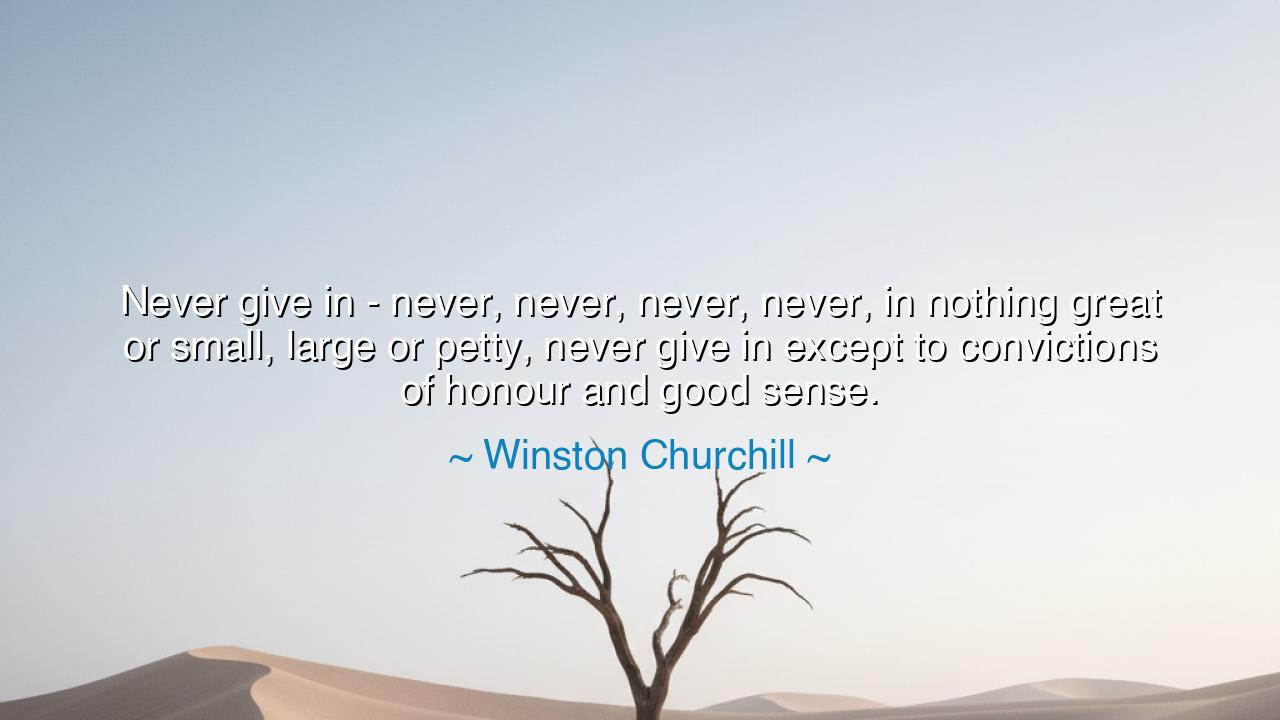
Never give in - never, never, never, never, in nothing great or
Never give in - never, never, never, never, in nothing great or small, large or petty, never give in except to convictions of honour and good sense.






In this thunderous command to the human spirit, Winston Churchill, the indomitable voice of Britain during its darkest hour, declared: “Never give in — never, never, never, never, in nothing great or small, large or petty, never give in except to convictions of honour and good sense.” These words, spoken in 1941 to the boys of Harrow School — the very halls where he himself had once studied — were not the polished rhetoric of a politician. They were the cry of a man who had stared into the abyss of war and refused to bow. In this single sentence, Churchill captured the essence of endurance, the ancient virtue that separates the conqueror from the conquered, the soul that endures from the one that breaks.
The meaning of this quote is both simple and profound. It is a call to unyielding perseverance, to the refusal to surrender in the face of hardship, despair, or defeat. Yet Churchill’s brilliance lies in his precision — he does not say “never give in” to everything, but only “except to convictions of honour and good sense.” Thus, perseverance is not blind stubbornness; it is guided by wisdom and morality. To persist in folly is arrogance, but to persist in righteousness is greatness. What he teaches here is the art of moral endurance — the ability to hold firm not for pride’s sake, but for the sake of what is true, just, and worthy of the soul’s loyalty.
The origin of this statement shines through the forge of war. When Churchill uttered these words, the world was shrouded in fear. Britain stood alone against the monstrous power of Nazi Germany. France had fallen. The cities of England trembled beneath nightly bombings. The seas were hunted by submarines. Many believed that Britain’s fate was sealed — that surrender was only a matter of time. Yet Churchill, standing amid the ruins, refused to bend. His voice, heavy with defiance, carried the ancient echo of those who stand alone yet unbroken — like Leonidas at Thermopylae, or the Romans defending their crumbling empire. For him, to yield was to die, not only as a nation but as a people of conscience.
Indeed, Churchill’s words remind us that perseverance is the shield of civilization. It is the courage that sustains men and nations when strength seems spent. He knew that history is not written by those who win easily, but by those who endure when hope itself seems lost. When London burned, and the skies glowed red with flame, it was this spirit — this refusal to give in — that kept Britain alive. And from that endurance came victory. For in the great struggle of the world, the battle is often not to the strongest, but to the most steadfast.
History offers countless mirrors of this truth. Consider Abraham Lincoln, who faced years of failure, ridicule, and rejection before his rise. He lost elections, suffered personal tragedy, and presided over a nation tearing itself apart — yet he never gave in. Or look to Nelson Mandela, who endured twenty-seven years in prison, emerging unbroken to forgive his captors and rebuild his nation. Each of these men, in his own time, embodied Churchill’s creed. They understood that persistence is not a single act of courage, but a way of living, a daily choice to rise again and again, even when the world seems set against you.
The lesson that Churchill’s words impart is timeless: life will test you, and often the test will come when your heart feels weakest. You will be tempted to yield — to despair, to bitterness, to apathy. But the soul that endures through trial grows unbreakable. Let honour be your compass, and good sense your guide; hold fast to what is right, even when it costs you dearly. For surrender to convenience or fear is the slow death of greatness. Remember that every mountain yields to those who keep climbing, every night ends for those who keep the flame alive.
And so, my child, take these words as your shield in every storm: Never give in — not to discouragement, not to doubt, not to the soft whisper of surrender. The path of honour is often the hardest, but it is also the most luminous. Rise when you are struck down. Stand firm when others fall away. Endure not because victory is certain, but because righteousness demands it. For the world belongs, in the end, not to the mighty, nor to the swift, but to those who — through all darkness, pain, and fire — refuse to yield.






AAdministratorAdministrator
Welcome, honored guests. Please leave a comment, we will respond soon